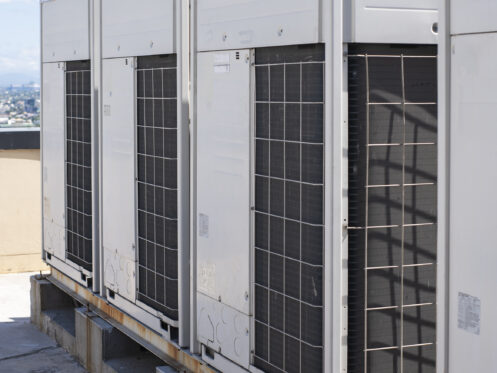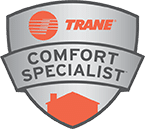A commercial air conditioner plays a critical role in the comfort and productivity of environments like retail spaces, office buildings, industrial facilities, and more. Due to the substantial energy consumption and the costs that are associated with it, increasing the efficiency of a commercial AC is essential. This comprehensive guide explores the benefits and strategies regarding commercial ACs.
Understanding Commercial Air Conditioning
Just like residential air conditioning, various types of commercial AC systems are available. Each of these systems has its benefits over the others. Knowing which AC is optimal for your specific property is useful. An HVAC company will be able to help you make this decision after assessing your property. Some common AC types are:
Central Air Conditioning System
This is the most traditional type of air conditioning system. Cool air flows through a network of ducts that go to different areas of the commercial property. This type of air conditioning system is good at cooling large spaces. Two of the most common types of central air conditioning systems used in commercial spaces are chiller systems and packaged rooftop units (RTUs).
Heat Pump System
Heat pump systems are versatile because they can both cool or warm a property without the need for an additional furnace. This makes them great for year-round use. They primarily function by transferring heat between indoor and outdoor spaces based on warming or cooling needs instead of generating warm or cool air themselves. When a heat pump system is in cooling mode, heat is extracted from indoor air and is then released outside. This is similar to how traditional air conditioners work, however traditional systems requires the use of additional furnace to warm the property during colder months.
Split Air Conditioning System
Ductless mini-split air conditioning systems use refrigerant lines that connect interior blower units to the outdoor AC unit. The lack of needed ductwork makes for an easier installation and is ideal for properties where space is limited. Multiple indoor units can be connected to a single outdoor unit while maintaining independent cooling for that interior unit’s zone. Because they function as heat pumps, many split air conditioning systems can both heat and cool an area. The efficiency of these systems is particularly good with properties that have many offices or rooms.
Benefits of Efficient Air Conditioning
Increasing the efficiency of a commercial air conditioning system has many benefits that property owners may appreciate. Some of these benefits of efficient air conditioning include:
Lower Energy Bills
Large commercial properties can be expensive to keep cool, especially in the hottest months of the year. One of the most obvious benefits of a more energy-efficient air conditioning system is less energy consumption. When you have an efficient system and take additional measures to further increase efficiency, this can lead to noticeable savings on your monthly energy bills.
Increased Interior Comfort
Efficient air conditioning systems also help maintain a comfortable temperature inside your commercial property. With a less efficient AC system, it may struggle to reach the desired temperature even when working at full capacity. When your business is comfortable, staff can do their job easier and customers or clients will be happier.
Reduced Need for Repairs
Efficient systems reduce the workload your AC system has when cooling your property. This reduced workload also decreases stress on critical components, slowing wear and tear. This slower wear and tear means that problems will occur less frequently, saving money that would otherwise be spent on more frequent repairs.
Longer System Lifespan
The slower wear and tear of components from an efficient system also helps to increase the lifespan of the air conditioning system. Because it can be costly to replace a commercial air conditioner system, ensuring a longer lifespan is another financial benefit of commercial AC efficiency.
Considerations for Enhancing Efficiency
There are several strategies to consider that will help increase the efficiency of a commercial air conditioning system. Some of these considerations for a more efficient system are:
Proper System Design and Sizing
The accurate calculation of cooling loads is an essential part of ensuring that your air conditioning system is the correct size. Oversized systems waste energy due to frequent on-and-off cycling. Undersized systems use too much energy while they struggle to maintain temperatures. In addition to system sizing, zone control systems can be installed and utilized to further increase system efficiency.
Regular Cleaning and Maintenance
Regular cleaning and scheduled maintenance are the key to ensuring that an air conditioning system continues to run efficiently. Air filters need to be replaced as needed, and the system’s coils should be cleaned regularly. Your technician will also check your system’s refrigerant levels. During a maintenance appointment, they’ll inspect ductwork and other vital areas for leaks or obstructions.
Energy-Efficient Equipment
Specific models can be more energy-efficient than others. Consider investing in an AC with a higher seasonal energy efficiency ratio (SEER). A system with a higher SEER rating may cost more upfront, but the increased efficiency of the system can be more cost-effective in the long run.
Advanced Controls and Automation
Many advanced controls and automation technology can be used to further increase the efficiency of an AC system. Programmable thermostats can allow you to automatically adjust the temperatures based on occupancy schedules. Occupancy sensors can be installed to ensure unoccupied areas aren’t unnecessarily cooled.
Renewable Energy Integration
You can integrate your AC with renewable energy sources. Solar panels on the roof are one way to do this. There are also geothermal systems that can help provide efficient cooling.
Proper Sealing
The efficiency of your system is wasted if there are air leaks throughout the property. Major air leaks need to be sealed to prevent cool air from getting out and warm air from getting in. Windows and doors are common areas of air leaks.
Sufficient Insulation
Insulation is also useful to help with energy efficiency. Good insulation will help contribute to maintaining the temperature inside your property. Additionally, you can use things like reflective films on windows to help reduce heat gain.
Occupant Education
Another great way to increase the efficiency of your system is to ensure that occupants are educated on proper energy-saving practices. This can include things like using blinds to block direct sunlight and ensuring that windows and doors to the outside remain closed.
Incentives and Rebates
Explore any available rebates, tax credits, or other incentives that may be available to you. These incentives can be offered by federal, state, and local governments depending on the energy efficiency of your system. Additionally, many utility companies offer rebates for properties that use energy-efficient equipment.
Do you live in San Antonio, TX or the surrounding areas and need an air conditioner installed at your property? At Air Authority, A Riteway Service Company, we can help with the installation of several types of HVAC systems for both residential and commercial properties. We can help with new construction installations, system upgrades, maintenance, and repair work. We can also help you with duct cleaning, air purification, insulation, water heaters, generators, and more. If you’re interested in a commercial AC installation or have questions regarding our other services, contact Air Authority, A Riteway Service Company.





